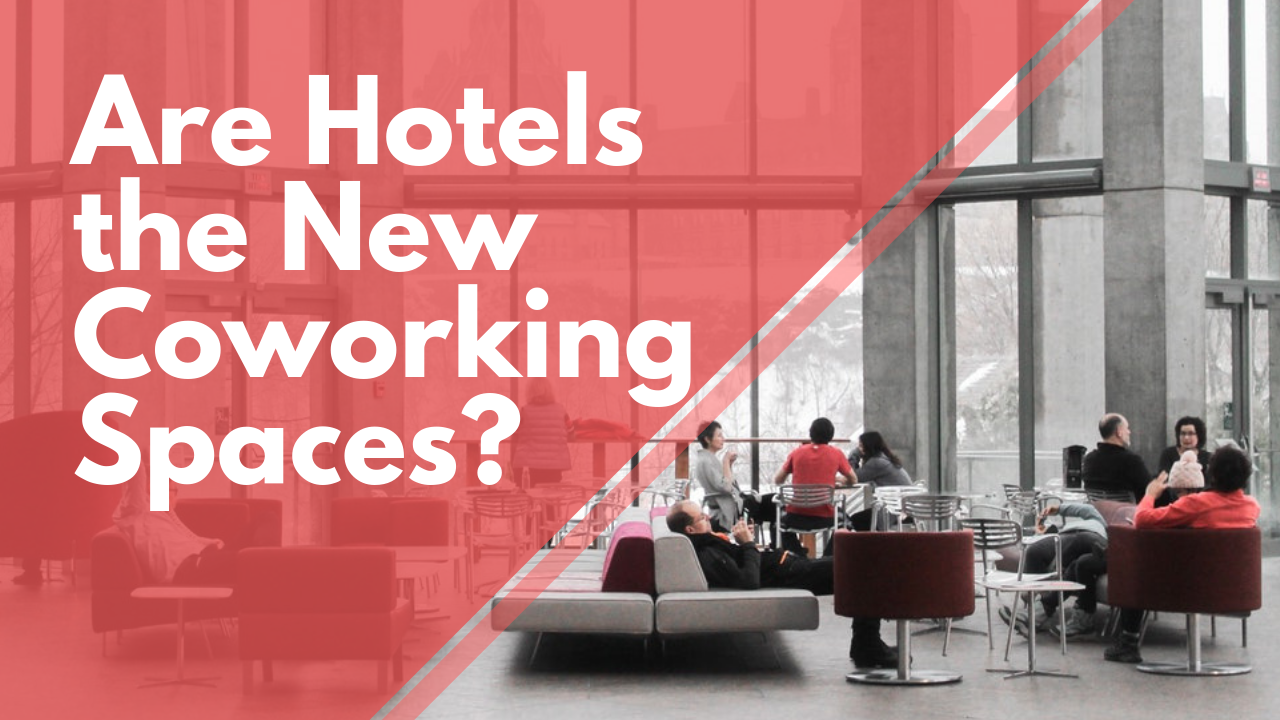- Various hotel brands are transforming their lobbies and common areas into coworking space in order to cater to the needs and demands of flexible workers and business travelers.
- Hotel brands have approached this new strategy by creating their own coworking brands or by partnering with existing coworking providers.
- Hotels naturally have a customer-centric approach, which can serve as a differentiating value proposition.
When traveling on business, working from hotels is second nature. Whether it’s from a reserved meeting room, business lounge, the lobby or even your own room, hotels have been equipped to cater for business guests for decades.
However, expectations of when, where and how people work have changed dramatically in recent years. And with it, expectations of the workplace have changed too.
Working alone in a hotel room or from a noisy lobby no longer meets the needs of flexible workers, who have come to expect a higher standard of workspace that’s collaborative, service-led and ergonomic.
So it comes as little surprise that a growing number of hotels are now seeking to meet the needs of the modern business guest by providing fully equipped coworking spaces in their hotels. Of course, the ‘modern business guest’ includes anyone from CEOs, sales teams and conference attendees to location-independent freelancers and digital nomads.
Just last year, digital nomad and Allwork.Space contributor Robert Kropp visited the Hotel Tryp by Wyndham in Dubai and made full use of their highly rated coworking space, NEST.
At the time, Kropp noted that there were few brands attempting to integrate coworking spaces into hotels, and even fewer that got it right. However, NEST was one of them.
Suggested Reading: Finally, A Hotel Coworking Space That Gets It Right
Since then, a number of hotel brands have revamped their workspace offering to create a more comfortable and productive space that appeals to guests and local residents alike.
In an interview with Allwork.Space, JLL’s Tom Carroll, head of EMEA corporate research and Jessica Jahns, head of EMEA Hotels & Hospitality research, revealed a number of examples of hotels successfully crossing the line into coworking:
- The Hotel Schani Wien in Vienna offers a 10-day coworking pass to its lobby for the equivalent of about US$100.
- Spacemize is a passport style system that enables entrepreneurs to work from luxury venues on a flexible and cost-effective basis. Current hotel venues include the Dakota Deluxe Hotel in Leeds, Andaz Liverpool Street, Crowne Plaza London (The City and Kensington), The Megaro Hotel, and the Sheraton Park Lane Hotel.
- The Virgin Hotel in Chicago charges a monthly membership fee to the Virgin Commons Club.
- The Sheraton chain is reportedly revamping more than 400 existing lobbies so that each one will be outfitted with a “productivity table” that includes outlets, USB ports and rentable drawers.
It’s a natural progression for hotels.
Coworking is in demand, and hotels already have the space and service infrastructure to cater to the needs of flexible workers. It enables hotel owners to generate extra revenue and add more value to business guests, thereby increasing loyalty.
It’s easy to see why this trend is growing. So how is it evolving?
“We’re seeing a number of different models emerging, such as the Hotel Schani Wien in Vienna, which has developed its own coworking pass. Then there’s Spacemize — a third party company that has set up contracts with key hotels throughout London, and is offering access to hotel workspaces along with discounted rates on rooms and spa facilities,” commented Jessica Jahns, head of EMEA Hotels & Hospitality research at JLL.
Jahns cites another model currently being tested by AccorHotels. The brand has partnered with coworking operator Nextdoor and is trialling a hotel coworking space in Paris. If successful, the partnership aims to roll out as many as 80 collaborative hotel workspaces by 2022.
Given the significant weight of the hotel industry and its fresh thirst for collaborative workspace, could this spell trouble for coworking operators?
“The trend is very embryonic at the moment,” commented Tom Carroll, head of EMEA corporate research at JLL. “In the short to medium term, we expect to see a lot of innovation, experimentation and diversity within the marketplace.”
However, he doesn’t expect hotels to take over the coworking sector anytime soon.
“There is huge demand for coworking. The flexible office space sector across Europe has more than doubled in size since 2014 and is set to grow by up to 30% per year over the next five years. Coworking is incredibly diverse and we’re seeing so much innovation coming from coworking providers. That’s what makes it so interesting and exciting, and that will certainly continue.”
For coworking operators, just as there is the potential for partnership opportunities with landlords and real estate developers, there is also the potential for partnership opportunities with hotel companies.
As Carroll and Jahns noted, most of the demand for hotel coworking is happening in city centre locations where hotels have a lot of visitors passing through. Likewise, the concentration of coworking is generally greater in city centre locations and transport hubs, which offers natural opportunities for experimentation between hotel owners and coworking providers looking for expansion.
“Hotels already have a natural source of demand from guests. By nature, those people are mobile and hotels are building from that base in demand. But they are also looking to expand, to attract external visitors that aren’t guests and add revenue to their existing infrastructure. That’s where coworking comes in.”
The big question for coworking operators is, what about community?
Some guests stay at hotels for just a matter of days. How do you build and sustain a positive community with such a high turnover rate?
While hotels may not be able to emulate the same sense of community found in spaces with long-term members, they do have a significant advantage in their service-focused approach.
“Hotels have a customer-centric approach in everything they do, which is crossing over into the flexible workspace industry,” noted Jahns.
“There are a lot of flexible space operators that employ CEOs from hospitality backgrounds [such as Fora in London] and the industry is increasingly adopting a hotel style strategy. Many hotels have guests that stay with them regularly so therefore have every opportunity to build a sense of community and loyalty within their coworking spaces.”
Looking ahead, is this trend likely to continue?
“One of the key things is the high quality of service and amenities that are being provided in both sectors. Hotels clearly see this confluence and are keen to explore ways in which they can drive additional revenue within their own offering,” noted Carroll.
“It’s clear that a growing number of hotel operators are exploring the opportunities of coworking, and likewise, coworking operators are continuing to innovate, grow, and evolve.
“We absolutely see this trend continuing.”


 Dr. Gleb Tsipursky – The Office Whisperer
Dr. Gleb Tsipursky – The Office Whisperer Nirit Cohen – WorkFutures
Nirit Cohen – WorkFutures Angela Howard – Culture Expert
Angela Howard – Culture Expert Drew Jones – Design & Innovation
Drew Jones – Design & Innovation Jonathan Price – CRE & Flex Expert
Jonathan Price – CRE & Flex Expert











